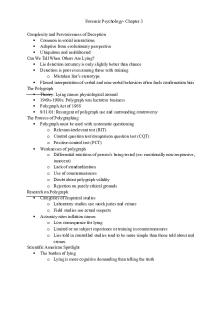Research Methods in Psychology Chapter 3 Part 3 PDF

| Title | Research Methods in Psychology Chapter 3 Part 3 |
|---|---|
| Course | Research Methods in Psychology |
| Institution | Douglas College |
| Pages | 1 |
| File Size | 38.8 KB |
| File Type | |
| Total Downloads | 59 |
| Total Views | 152 |
Summary
Chapter 3 Notes...
Description
Research Methods in Psychology Chapter 3 Part 3 Notes Summary: Summary The three claims, four validities framework enables you to systematically evaluate any study you read, whether in a journal article or a popular mediastory. It can also guide you in making choices about research you might conduct yourself. VARIABLES - Variables, concepts of interest that vary, form the core of psychological research. A variable has at least two levels.Variables can be measured or manipulated.Variables in a study can be described in two ways: as conceptual variables(elements of a theory) and as operational definitions (specific measures or manipulations in order to study them). THREE CLAIMS - As a consumer of information, you will identify three types of claims that researchers, journalists, and other writers make about research: frequency,association, and causal claims.Frequency claims make arguments about the level of a single, measured variable in a group of people.Association claims argue that two variables are related to each other. An Association can be positive, negative, or zero. Association claims are usually supported by correlational studies, in which all variables are measured. When you know how two variables are associated, you can use one to predict the other. - Causal claims state that one variable is responsible for changes in the other variable. To support a causal claim, a study must meet three criteria—covariance, temporal precedence, and internal validity—which is accomplished only by an experimental study INTERROGATING THE THREE CLAIMS USING THE FOUR BIG VALIDITIES - To interrogate a frequency claim, ask questions about the study's construct validity (quality of the measurements), external validity(generalizability to a larger population), and statistical validity (the percentage estimate, its confidence interval, and other estimates of the percentage). - To interrogate an association claim, ask about its construct, external, and statistical validity. Statistical validity addresses the strength of a relationship, the precision with which it is estimated, and whether it has been replicated in other studies.To interrogate a causal claim, ask whether the study conducted was an experiment, which is the only way to establish internal validity and temporal precedence. If it was an experiment, further assess internal validity by asking whether the study was designed with any confounds and whether the researchers randomly assigned participants to groups.You can also ask about the study’s construct, external, and statisticalvalidity.Researchers usually cannot achieve all four validities at once in an experiment, so they prioritize them. Their interest in making a causal statement means they may sacrifice external validity to ensure internal validity....
Similar Free PDFs

Research Methods Homework 3
- 3 Pages

Sampling Methods in Psychology
- 1 Pages

Forensic Psychology Chapter 3
- 3 Pages

Psychology Chapter 3 Notes
- 4 Pages

Chapter 3 Psychology
- 8 Pages

Psychology Notes- chapter 3
- 3 Pages

Abnormal Psychology Chapter 3
- 9 Pages

Chapter 2- Research Methods
- 16 Pages

Chapter 3 Research Proposal
- 19 Pages
Popular Institutions
- Tinajero National High School - Annex
- Politeknik Caltex Riau
- Yokohama City University
- SGT University
- University of Al-Qadisiyah
- Divine Word College of Vigan
- Techniek College Rotterdam
- Universidade de Santiago
- Universiti Teknologi MARA Cawangan Johor Kampus Pasir Gudang
- Poltekkes Kemenkes Yogyakarta
- Baguio City National High School
- Colegio san marcos
- preparatoria uno
- Centro de Bachillerato Tecnológico Industrial y de Servicios No. 107
- Dalian Maritime University
- Quang Trung Secondary School
- Colegio Tecnológico en Informática
- Corporación Regional de Educación Superior
- Grupo CEDVA
- Dar Al Uloom University
- Centro de Estudios Preuniversitarios de la Universidad Nacional de Ingeniería
- 上智大学
- Aakash International School, Nuna Majara
- San Felipe Neri Catholic School
- Kang Chiao International School - New Taipei City
- Misamis Occidental National High School
- Institución Educativa Escuela Normal Juan Ladrilleros
- Kolehiyo ng Pantukan
- Batanes State College
- Instituto Continental
- Sekolah Menengah Kejuruan Kesehatan Kaltara (Tarakan)
- Colegio de La Inmaculada Concepcion - Cebu






